外研版(2019)选择性必修第一册Unit 1 Laugh out loud! Using language 教案
文档属性
| 名称 | 外研版(2019)选择性必修第一册Unit 1 Laugh out loud! Using language 教案 | 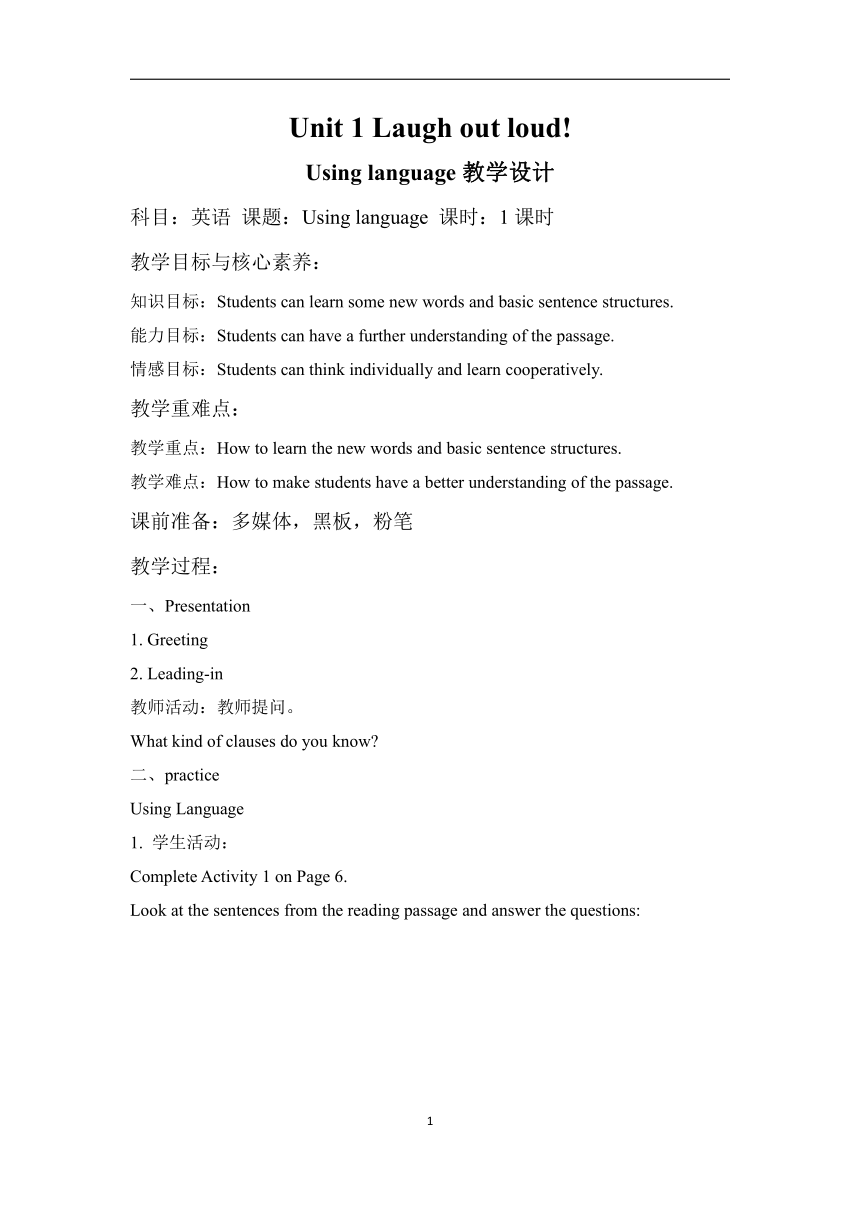 | |
| 格式 | docx | ||
| 文件大小 | 1.4MB | ||
| 资源类型 | 教案 | ||
| 版本资源 | 外研版(2019) | ||
| 科目 | 英语 | ||
| 更新时间 | 2023-10-24 17:47:29 | ||
图片预览

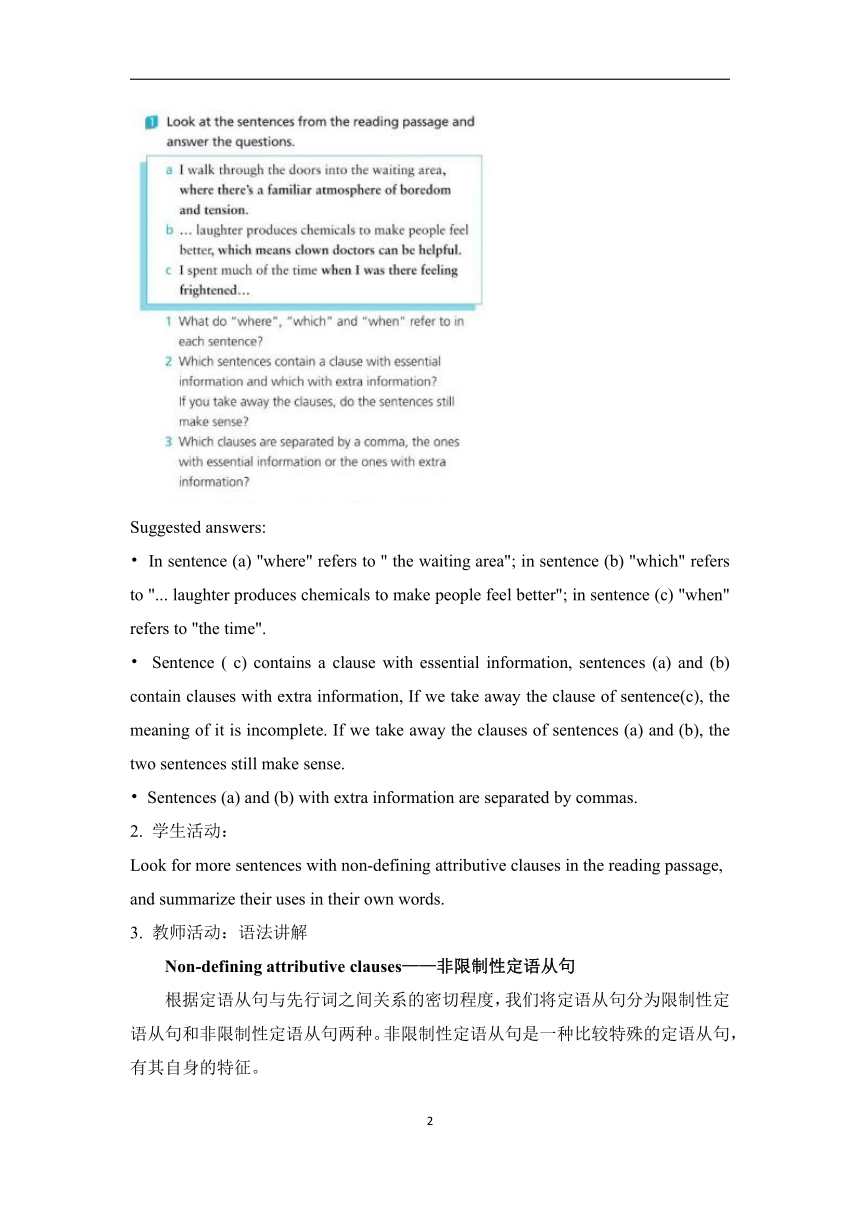
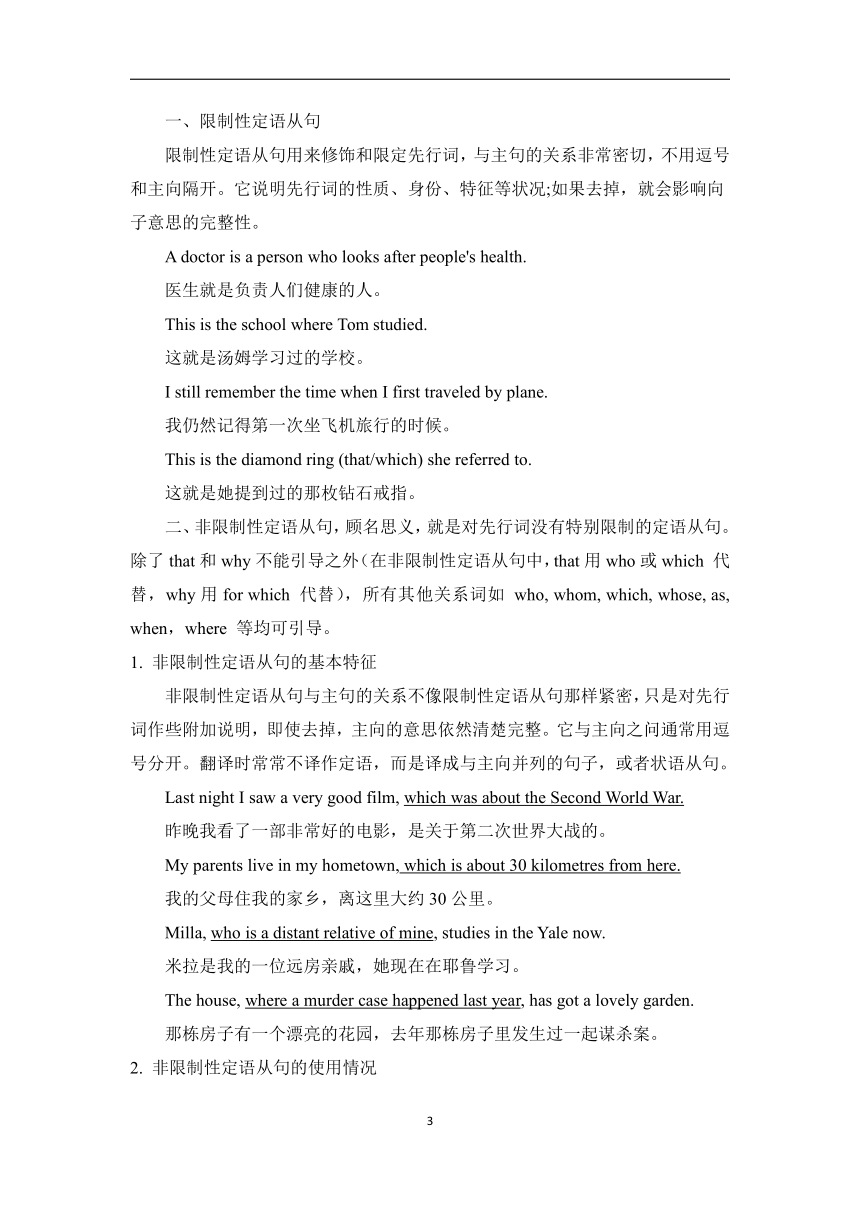
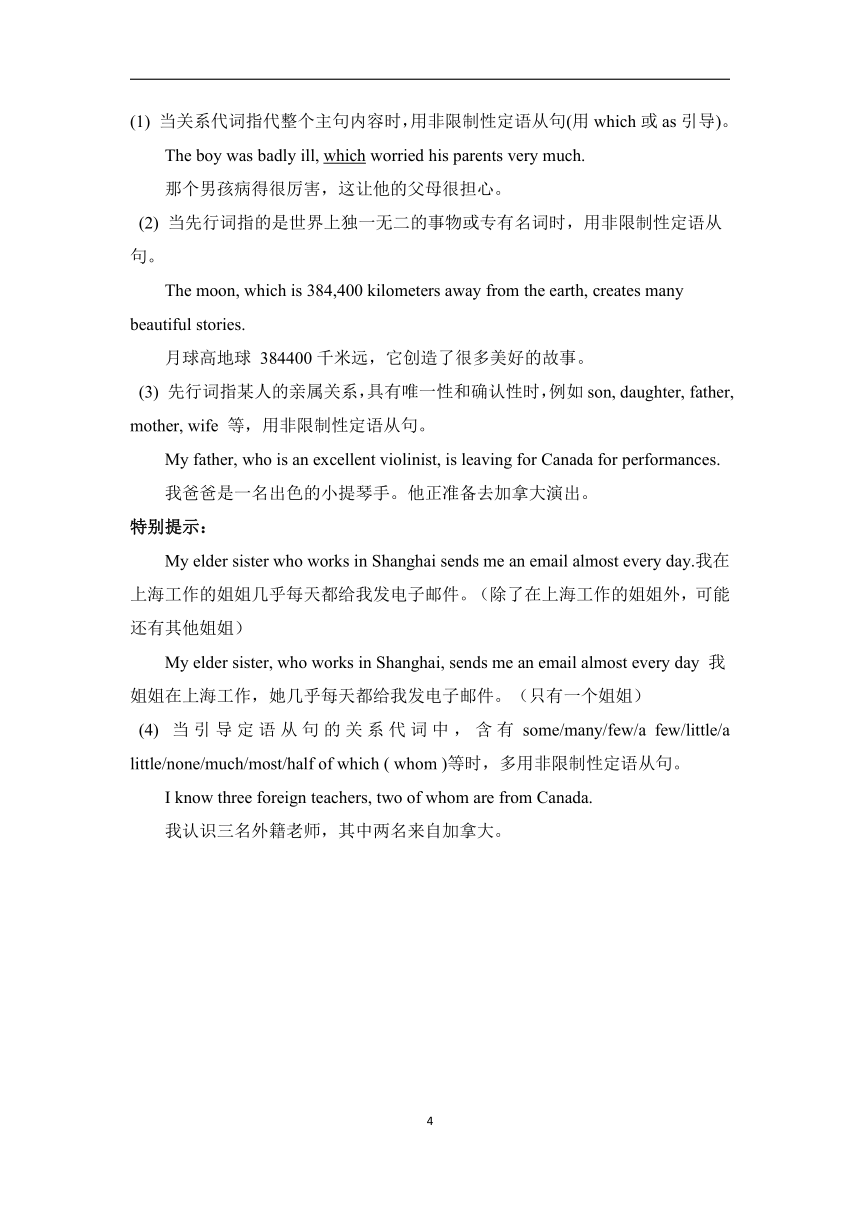
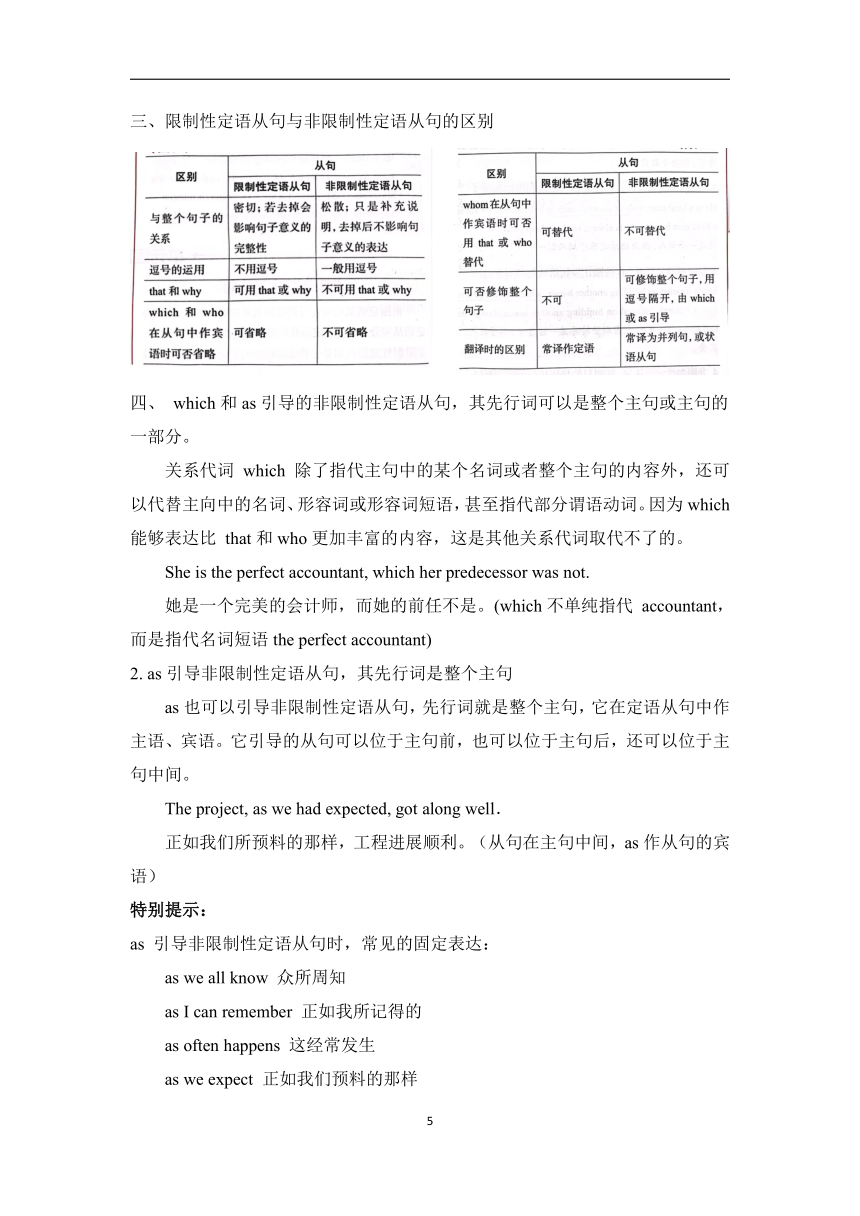
文档简介
Unit 1 Laugh out loud!
Using language教学设计
科目:英语 课题:Using language 课时:1课时
教学目标与核心素养:
知识目标:Students can learn some new words and basic sentence structures.
能力目标:Students can have a further understanding of the passage.
情感目标:Students can think individually and learn cooperatively.
教学重难点:
教学重点:How to learn the new words and basic sentence structures.
教学难点:How to make students have a better understanding of the passage.
课前准备:多媒体,黑板,粉笔
教学过程:
一、Presentation
1. Greeting
2. Leading-in
教师活动:教师提问。
What kind of clauses do you know
二、practice
Using Language
1. 学生活动:
Complete Activity 1 on Page 6.
Look at the sentences from the reading passage and answer the questions:
Suggested answers:
In sentence (a) "where" refers to " the waiting area"; in sentence (b) "which" refers to "... laughter produces chemicals to make people feel better"; in sentence (c) "when" refers to "the time".
Sentence ( c) contains a clause with essential information, sentences (a) and (b) contain clauses with extra information, If we take away the clause of sentence(c), the meaning of it is incomplete. If we take away the clauses of sentences (a) and (b), the two sentences still make sense.
Sentences (a) and (b) with extra information are separated by commas.
2. 学生活动:
Look for more sentences with non-defining attributive clauses in the reading passage, and summarize their uses in their own words.
3. 教师活动:语法讲解
Non-defining attributive clauses——非限制性定语从句
根据定语从句与先行词之间关系的密切程度,我们将定语从句分为限制性定语从句和非限制性定语从句两种。非限制性定语从句是一种比较特殊的定语从句,有其自身的特征。
一、限制性定语从句
限制性定语从句用来修饰和限定先行词,与主句的关系非常密切,不用逗号和主向隔开。它说明先行词的性质、身份、特征等状况;如果去掉,就会影响向子意思的完整性。
A doctor is a person who looks after people's health.
医生就是负责人们健康的人。
This is the school where Tom studied.
这就是汤姆学习过的学校。
I still remember the time when I first traveled by plane.
我仍然记得第一次坐飞机旅行的时候。
This is the diamond ring (that/which) she referred to.
这就是她提到过的那枚钻石戒指。
二、非限制性定语从句,顾名思义,就是对先行词没有特别限制的定语从句。除了that和why不能引导之外(在非限制性定语从句中,that用who或which 代替,why用for which 代替),所有其他关系词如 who, whom, which, whose, as, when,where 等均可引导。
1. 非限制性定语从句的基本特征
非限制性定语从句与主句的关系不像限制性定语从句那样紧密,只是对先行词作些附加说明,即使去掉,主向的意思依然清楚完整。它与主向之问通常用逗号分开。翻译时常常不译作定语,而是译成与主向并列的句子,或者状语从句。
Last night I saw a very good film, which was about the Second World War.
昨晚我看了一部非常好的电影,是关于第二次世界大战的。
My parents live in my hometown, which is about 30 kilometres from here.
我的父母住我的家乡,离这里大约30公里。
Milla, who is a distant relative of mine, studies in the Yale now.
米拉是我的一位远房亲戚,她现在在耶鲁学习。
The house, where a murder case happened last year, has got a lovely garden.
那栋房子有一个漂亮的花园,去年那栋房子里发生过一起谋杀案。
2. 非限制性定语从句的使用情况
(1) 当关系代词指代整个主句内容时,用非限制性定语从句(用which或as引导)。
The boy was badly ill, which worried his parents very much.
那个男孩病得很厉害,这让他的父母很担心。
(2) 当先行词指的是世界上独一无二的事物或专有名词时,用非限制性定语从句。
The moon, which is 384,400 kilometers away from the earth, creates many beautiful stories.
月球高地球 384400千米远,它创造了很多美好的故事。
(3) 先行词指某人的亲属关系,具有唯一性和确认性时,例如son, daughter, father, mother, wife 等,用非限制性定语从句。
My father, who is an excellent violinist, is leaving for Canada for performances.
我爸爸是一名出色的小提琴手。他正准备去加拿大演出。
特别提示:
My elder sister who works in Shanghai sends me an email almost every day.我在上海工作的姐姐几乎每天都给我发电子邮件。(除了在上海工作的姐姐外,可能还有其他姐姐)
My elder sister, who works in Shanghai, sends me an email almost every day 我姐姐在上海工作,她几乎每天都给我发电子邮件。(只有一个姐姐)
(4) 当引导定语从句的关系代词中,含有some/many/few/a few/little/a little/none/much/most/half of which ( whom )等时,多用非限制性定语从句。
I know three foreign teachers, two of whom are from Canada.
我认识三名外籍老师,其中两名来自加拿大。
三、限制性定语从句与非限制性定语从句的区别
四、 which和as引导的非限制性定语从句,其先行词可以是整个主句或主句的一部分。
关系代词 which 除了指代主句中的某个名词或者整个主句的内容外,还可以代替主向中的名词、形容词或形容词短语,甚至指代部分谓语动词。因为which能够表达比 that和who更加丰富的内容,这是其他关系代词取代不了的。
She is the perfect accountant, which her predecessor was not.
她是一个完美的会计师,而她的前任不是。(which不单纯指代 accountant,而是指代名词短语the perfect accountant)
2. as引导非限制性定语从句,其先行词是整个主句
as也可以引导非限制性定语从句,先行词就是整个主句,它在定语从句中作主语、宾语。它引导的从句可以位于主句前,也可以位于主句后,还可以位于主句中间。
The project, as we had expected, got along well.
正如我们所预料的那样,工程进展顺利。(从句在主句中间,as作从句的宾语)
特别提示:
as 引导非限制性定语从句时,常见的固定表达:
as we all know 众所周知
as I can remember 正如我所记得的
as often happens 这经常发生
as we expect 正如我们预料的那样
as you see 如你所见
as has been said before 如前所述
as is well known 众所周知
as was expected 正如预料的那样
as can be seen 看得出来
as may be imagined 正如可以想象出来的那样
as has been said above 如上所述
as we all can see 正如我们都能看到的那样
as is often the case 情况常常如此
as everybody can do 正像人人都能做到的那样
3. as与which引导的非限制性定语从句的区别
关系代词as与which引导的非限制性定语从句,其先行词都可以是整个主句。但as和which具有不同的词义和用法。
(1) as引导的定语从句,表示说话人的看法、态度、解释或评论。
引导定语从句时,as仍具有“正如,像,由……可知”等意思,这些字眼翻译时可 不必译出。as定语从句中常含有这些动词:see, know, hear, watch, remember, say, tell, show, expect, guess等。这类动词与as连用几乎成了一种固定搭配。as引导的定语从句可以置于句首、句中或向尾。
Respecting the old and taking care of the young, as we all know, is a good Chinese tradition.
众所周知,尊老爱幼是中国人的优良传统。
(2) which引导的从句对主句所叙述的事情进行补充说明表明事物的状态或结果。
which此时指前面主句所提到的这件事,常译为“这一点,这件事”等。这时它所引导的从句与主句之间常表示并列意义或状语意义。注意它引导的从句不像as那样位置灵活,它只能位于主句的后面。
He changed his mind again, which (= and it) made us all angry.
他又改变了主意,这使我们大家都生气了。
(3)在从句中作定语或介词的宾语时,要用 which。
Jenny might come, in which case I'll ask her.
詹妮可能会来,要是那样的话我就去问她。
(4)当从句的谓语是否定形式或含着一个复合宾语时,一般用which而不用as。
He pretended not to know me, which I didn't understand.
他假装不认识我,这是我搞不明白的。
练习:
1. After watching their performance, people _______ are in a bad mood will cheer up.
2. Students should involve themselves in community activities _______they can gain experience for growth.
3. I am looking forward to the day _______my daughter can read this book and know my feelings for her.
(Answer: who; where; when)
4. 学生活动:
(1) Do Activity 2 on Page 6.
(Suggested answers:
Go for a walk in the countryside, where you can enjoy the beautiful views and a peaceful atmosphere.
Spend time with your family and friends, which will activate chemicals in your brain to make you feel happier.
Try to accept your mistakes, where/through which you can learn a lot.
Close your eyes and picture the future, where you've made your dreams come true.)
(2) 学生活动:Do Activity 3 on Page 7.
Do the Activity individually first and then check answers together.
(Suggested answers:
①who is lying next to him
②which he finds annoying
③which he thinks will impress Holmes
④who has lost his patience by now)
5. 学生活动:Think of a joke and write it down using non-defining attributive clauses where appropriate. Then share the joke with the class.
6. 教师活动:Play the tape for students and ask them to complete the conversations.
学生活动:(1)Do Activity 5 on Page 7.
Suggested answers:
①ear to ear ②head off ③smile ④laughing ⑤a smile
(2) Do Activity 6 on Page 8.
(Suggested answers:
laughing stock; be all smiles; grin from ear to ear; crack a smile; laugh one's head off)
7. 教师活动:
Ask students to work in groups and think of more expressions about laughter.
Guide students to discuss other situations in which they could use these expressions.
Ask students to read "Did You Know " and learn more about April Fool's Day.
8. 学生活动:
(1) Listen to the radio programme and choose the pictures mentioned.
(Suggested answers: a c d)
(2) Complete the notes
(Suggested answers:
"the washing of the lions"
18th and 19th centuries
1965
BBC News Channel
smells to be carried
1957
a really good harvest)
9. 教师活动:
Ask students to discuss which of the practical jokes they think is funny and why.
Ask students to complete the boxes with expressions from the radio programme.
(Suggested answers:
Telling a story: Let's start with...; Now, my favourite one...
Making comments: It's a good one! I don't get it. That's so funny! I can imagine!)
三、Production
教师活动:练习
(1) I lost a book, _______ I can't remember now.
A. whose title
B. its title
C. the title of it
D. the title of that
(2) Last summer we visited the West Lake, _______ Hangzhou is famous in the world.
A. for which
B. for that
C. in which
D. what
(3) This machine, _______for many years, is still working perfectly.
A. after which I have looked
B. which I have looked after
C. that I have looked after
D. I have looked after
(4) He is working hard, _______will make him pass the final exam.
A. that
B. which
C. for which
D. who
(5) My neighbours used to give me a hand in time of trouble, _______ was very kind of them.
A. who
B. which
C. that
D. it
(6) I shall never forget those years _______ I lived on the farm with farmers, _______ has a great effect on my life.
A. when; who
B. that; which
C. which; that
D. when; which
(7) The clever boy made a hole in the wall, _______ he could see_______ was going on inside house,
A. which; what
B. through which; what
C. through that; what
D. what; that
(8) I have bought two ball pens, _______writes well.
A. none of them
B. neither of them
C. neither of which
D. none of which
(Answer:
1. A whose title 引导非限制性定语从句,whose title也可以the title of which 来替换
2. A for which 引导定语从向,使用介词 to,是因为从向中的固定短语 be famous for…意为“以……而 闻名”
3. B which I have looked after 构成一个非限制性定语从句。
4. B 非限制性定语从向常用which引导,which指代前面整句话的含义
5. B 非限制性定语从向常用which引导,which指代前面整句话的含义。
6. D years是表示时间的名词,后面的定语从句中向子结构完整,故用when在从句中作时间状语。第三个空用which引导一个非限制性定语从句,指代前一句话的内容
7. B through which 引导定语从句,through which 即through the hole,在从句中作状语。what引导的是宾语从句,what 在从句中作主语。
8. C 先行词是two ball pens 指物,引导词应用which,表示两者之间的香定应用 neither of。)
四、Summary
重点语法:总结非限制性定语从句的含义和用法,并注意该部分新词汇第运用。
五、Homework
1. Give students some examples to fill in the blanks with non-defining attributive clauses.
2. Master the usages of the new vocabulary.
2
Using language教学设计
科目:英语 课题:Using language 课时:1课时
教学目标与核心素养:
知识目标:Students can learn some new words and basic sentence structures.
能力目标:Students can have a further understanding of the passage.
情感目标:Students can think individually and learn cooperatively.
教学重难点:
教学重点:How to learn the new words and basic sentence structures.
教学难点:How to make students have a better understanding of the passage.
课前准备:多媒体,黑板,粉笔
教学过程:
一、Presentation
1. Greeting
2. Leading-in
教师活动:教师提问。
What kind of clauses do you know
二、practice
Using Language
1. 学生活动:
Complete Activity 1 on Page 6.
Look at the sentences from the reading passage and answer the questions:
Suggested answers:
In sentence (a) "where" refers to " the waiting area"; in sentence (b) "which" refers to "... laughter produces chemicals to make people feel better"; in sentence (c) "when" refers to "the time".
Sentence ( c) contains a clause with essential information, sentences (a) and (b) contain clauses with extra information, If we take away the clause of sentence(c), the meaning of it is incomplete. If we take away the clauses of sentences (a) and (b), the two sentences still make sense.
Sentences (a) and (b) with extra information are separated by commas.
2. 学生活动:
Look for more sentences with non-defining attributive clauses in the reading passage, and summarize their uses in their own words.
3. 教师活动:语法讲解
Non-defining attributive clauses——非限制性定语从句
根据定语从句与先行词之间关系的密切程度,我们将定语从句分为限制性定语从句和非限制性定语从句两种。非限制性定语从句是一种比较特殊的定语从句,有其自身的特征。
一、限制性定语从句
限制性定语从句用来修饰和限定先行词,与主句的关系非常密切,不用逗号和主向隔开。它说明先行词的性质、身份、特征等状况;如果去掉,就会影响向子意思的完整性。
A doctor is a person who looks after people's health.
医生就是负责人们健康的人。
This is the school where Tom studied.
这就是汤姆学习过的学校。
I still remember the time when I first traveled by plane.
我仍然记得第一次坐飞机旅行的时候。
This is the diamond ring (that/which) she referred to.
这就是她提到过的那枚钻石戒指。
二、非限制性定语从句,顾名思义,就是对先行词没有特别限制的定语从句。除了that和why不能引导之外(在非限制性定语从句中,that用who或which 代替,why用for which 代替),所有其他关系词如 who, whom, which, whose, as, when,where 等均可引导。
1. 非限制性定语从句的基本特征
非限制性定语从句与主句的关系不像限制性定语从句那样紧密,只是对先行词作些附加说明,即使去掉,主向的意思依然清楚完整。它与主向之问通常用逗号分开。翻译时常常不译作定语,而是译成与主向并列的句子,或者状语从句。
Last night I saw a very good film, which was about the Second World War.
昨晚我看了一部非常好的电影,是关于第二次世界大战的。
My parents live in my hometown, which is about 30 kilometres from here.
我的父母住我的家乡,离这里大约30公里。
Milla, who is a distant relative of mine, studies in the Yale now.
米拉是我的一位远房亲戚,她现在在耶鲁学习。
The house, where a murder case happened last year, has got a lovely garden.
那栋房子有一个漂亮的花园,去年那栋房子里发生过一起谋杀案。
2. 非限制性定语从句的使用情况
(1) 当关系代词指代整个主句内容时,用非限制性定语从句(用which或as引导)。
The boy was badly ill, which worried his parents very much.
那个男孩病得很厉害,这让他的父母很担心。
(2) 当先行词指的是世界上独一无二的事物或专有名词时,用非限制性定语从句。
The moon, which is 384,400 kilometers away from the earth, creates many beautiful stories.
月球高地球 384400千米远,它创造了很多美好的故事。
(3) 先行词指某人的亲属关系,具有唯一性和确认性时,例如son, daughter, father, mother, wife 等,用非限制性定语从句。
My father, who is an excellent violinist, is leaving for Canada for performances.
我爸爸是一名出色的小提琴手。他正准备去加拿大演出。
特别提示:
My elder sister who works in Shanghai sends me an email almost every day.我在上海工作的姐姐几乎每天都给我发电子邮件。(除了在上海工作的姐姐外,可能还有其他姐姐)
My elder sister, who works in Shanghai, sends me an email almost every day 我姐姐在上海工作,她几乎每天都给我发电子邮件。(只有一个姐姐)
(4) 当引导定语从句的关系代词中,含有some/many/few/a few/little/a little/none/much/most/half of which ( whom )等时,多用非限制性定语从句。
I know three foreign teachers, two of whom are from Canada.
我认识三名外籍老师,其中两名来自加拿大。
三、限制性定语从句与非限制性定语从句的区别
四、 which和as引导的非限制性定语从句,其先行词可以是整个主句或主句的一部分。
关系代词 which 除了指代主句中的某个名词或者整个主句的内容外,还可以代替主向中的名词、形容词或形容词短语,甚至指代部分谓语动词。因为which能够表达比 that和who更加丰富的内容,这是其他关系代词取代不了的。
She is the perfect accountant, which her predecessor was not.
她是一个完美的会计师,而她的前任不是。(which不单纯指代 accountant,而是指代名词短语the perfect accountant)
2. as引导非限制性定语从句,其先行词是整个主句
as也可以引导非限制性定语从句,先行词就是整个主句,它在定语从句中作主语、宾语。它引导的从句可以位于主句前,也可以位于主句后,还可以位于主句中间。
The project, as we had expected, got along well.
正如我们所预料的那样,工程进展顺利。(从句在主句中间,as作从句的宾语)
特别提示:
as 引导非限制性定语从句时,常见的固定表达:
as we all know 众所周知
as I can remember 正如我所记得的
as often happens 这经常发生
as we expect 正如我们预料的那样
as you see 如你所见
as has been said before 如前所述
as is well known 众所周知
as was expected 正如预料的那样
as can be seen 看得出来
as may be imagined 正如可以想象出来的那样
as has been said above 如上所述
as we all can see 正如我们都能看到的那样
as is often the case 情况常常如此
as everybody can do 正像人人都能做到的那样
3. as与which引导的非限制性定语从句的区别
关系代词as与which引导的非限制性定语从句,其先行词都可以是整个主句。但as和which具有不同的词义和用法。
(1) as引导的定语从句,表示说话人的看法、态度、解释或评论。
引导定语从句时,as仍具有“正如,像,由……可知”等意思,这些字眼翻译时可 不必译出。as定语从句中常含有这些动词:see, know, hear, watch, remember, say, tell, show, expect, guess等。这类动词与as连用几乎成了一种固定搭配。as引导的定语从句可以置于句首、句中或向尾。
Respecting the old and taking care of the young, as we all know, is a good Chinese tradition.
众所周知,尊老爱幼是中国人的优良传统。
(2) which引导的从句对主句所叙述的事情进行补充说明表明事物的状态或结果。
which此时指前面主句所提到的这件事,常译为“这一点,这件事”等。这时它所引导的从句与主句之间常表示并列意义或状语意义。注意它引导的从句不像as那样位置灵活,它只能位于主句的后面。
He changed his mind again, which (= and it) made us all angry.
他又改变了主意,这使我们大家都生气了。
(3)在从句中作定语或介词的宾语时,要用 which。
Jenny might come, in which case I'll ask her.
詹妮可能会来,要是那样的话我就去问她。
(4)当从句的谓语是否定形式或含着一个复合宾语时,一般用which而不用as。
He pretended not to know me, which I didn't understand.
他假装不认识我,这是我搞不明白的。
练习:
1. After watching their performance, people _______ are in a bad mood will cheer up.
2. Students should involve themselves in community activities _______they can gain experience for growth.
3. I am looking forward to the day _______my daughter can read this book and know my feelings for her.
(Answer: who; where; when)
4. 学生活动:
(1) Do Activity 2 on Page 6.
(Suggested answers:
Go for a walk in the countryside, where you can enjoy the beautiful views and a peaceful atmosphere.
Spend time with your family and friends, which will activate chemicals in your brain to make you feel happier.
Try to accept your mistakes, where/through which you can learn a lot.
Close your eyes and picture the future, where you've made your dreams come true.)
(2) 学生活动:Do Activity 3 on Page 7.
Do the Activity individually first and then check answers together.
(Suggested answers:
①who is lying next to him
②which he finds annoying
③which he thinks will impress Holmes
④who has lost his patience by now)
5. 学生活动:Think of a joke and write it down using non-defining attributive clauses where appropriate. Then share the joke with the class.
6. 教师活动:Play the tape for students and ask them to complete the conversations.
学生活动:(1)Do Activity 5 on Page 7.
Suggested answers:
①ear to ear ②head off ③smile ④laughing ⑤a smile
(2) Do Activity 6 on Page 8.
(Suggested answers:
laughing stock; be all smiles; grin from ear to ear; crack a smile; laugh one's head off)
7. 教师活动:
Ask students to work in groups and think of more expressions about laughter.
Guide students to discuss other situations in which they could use these expressions.
Ask students to read "Did You Know " and learn more about April Fool's Day.
8. 学生活动:
(1) Listen to the radio programme and choose the pictures mentioned.
(Suggested answers: a c d)
(2) Complete the notes
(Suggested answers:
"the washing of the lions"
18th and 19th centuries
1965
BBC News Channel
smells to be carried
1957
a really good harvest)
9. 教师活动:
Ask students to discuss which of the practical jokes they think is funny and why.
Ask students to complete the boxes with expressions from the radio programme.
(Suggested answers:
Telling a story: Let's start with...; Now, my favourite one...
Making comments: It's a good one! I don't get it. That's so funny! I can imagine!)
三、Production
教师活动:练习
(1) I lost a book, _______ I can't remember now.
A. whose title
B. its title
C. the title of it
D. the title of that
(2) Last summer we visited the West Lake, _______ Hangzhou is famous in the world.
A. for which
B. for that
C. in which
D. what
(3) This machine, _______for many years, is still working perfectly.
A. after which I have looked
B. which I have looked after
C. that I have looked after
D. I have looked after
(4) He is working hard, _______will make him pass the final exam.
A. that
B. which
C. for which
D. who
(5) My neighbours used to give me a hand in time of trouble, _______ was very kind of them.
A. who
B. which
C. that
D. it
(6) I shall never forget those years _______ I lived on the farm with farmers, _______ has a great effect on my life.
A. when; who
B. that; which
C. which; that
D. when; which
(7) The clever boy made a hole in the wall, _______ he could see_______ was going on inside house,
A. which; what
B. through which; what
C. through that; what
D. what; that
(8) I have bought two ball pens, _______writes well.
A. none of them
B. neither of them
C. neither of which
D. none of which
(Answer:
1. A whose title 引导非限制性定语从句,whose title也可以the title of which 来替换
2. A for which 引导定语从向,使用介词 to,是因为从向中的固定短语 be famous for…意为“以……而 闻名”
3. B which I have looked after 构成一个非限制性定语从句。
4. B 非限制性定语从向常用which引导,which指代前面整句话的含义
5. B 非限制性定语从向常用which引导,which指代前面整句话的含义。
6. D years是表示时间的名词,后面的定语从句中向子结构完整,故用when在从句中作时间状语。第三个空用which引导一个非限制性定语从句,指代前一句话的内容
7. B through which 引导定语从句,through which 即through the hole,在从句中作状语。what引导的是宾语从句,what 在从句中作主语。
8. C 先行词是two ball pens 指物,引导词应用which,表示两者之间的香定应用 neither of。)
四、Summary
重点语法:总结非限制性定语从句的含义和用法,并注意该部分新词汇第运用。
五、Homework
1. Give students some examples to fill in the blanks with non-defining attributive clauses.
2. Master the usages of the new vocabulary.
2
